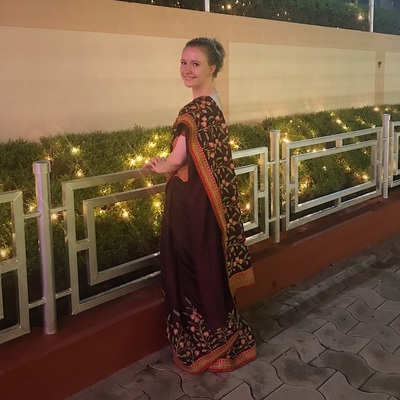
03/24/2020
Kiley Stoj wasn’t seeing much good news in her email inbox.
Stoj, a senior anthropology and biology dual major from Orchard Park, N.Y., spent the first half of the Spring 2020 semester studying abroad at St. Aloysius College in Mangalore, India. SUNY Cortland’s International Programs Office was sending updates about the novel coronavirus (COVID-19) and Stoj feared her study abroad program would be cut short.
Then she saw an email from the Fulbright U.S. Student Program.
“My heart was racing a mile a minute,” Stoj said. “I was so scared because I thought it was going to be bad news and I wasn’t sure if I was going to be emotionally ready for that. I eventually got courage to open the email and the first thing I saw was the ‘Congratulations’ and I jumped out of my chair.”

Stoj has received funding from a Fulbright-Nehru Student Research grant to conduct a study on the usage of plants in the ancient Indian style of Ayurvedic medicine during the Iron Age of 1,500 to 600 BCE.
It’s the perfect project for a student who hopes to someday pursue a Ph.D. in archaeobotany or ethnobotany, the cultural study of how plants are used for medicine, rituals or any variety of purposes.
The history of Ayurveda dates to at least the fourth century BCE, although some scholars claim it was likely practiced before that. It is a complex system of beliefs about physical and mental wellness that includes the use of many plant and mineral substances.
Stoj is particularly excited to research Ayurveda during the Iron Age since there is little known to today’s scientists and academics.
“There are pretty much no records or mention of Ayurveda during that time, which is I why I picked it,” she said. “It would be novel research. I want to visit archeological sites and see site reports on what type of plant material people are finding in Iron Age sites. And I will look to contemporary Ayurvedic practitioners and what they can tell me about the history of Ayurveda from their perspective and their knowledge of plants that have been used for thousands of years.”
Sharon Steadman, distinguished professor in Cortland’s Sociology/Anthropology Department, helped guide Stoj toward this field as her advisor.
Ayurveda is still practiced widely in India to this day. While some Indians have shunned it in favor of modern medicine, Ayurveda’s cultural relevance in India resonates.
Stoj got a first-hand look at Ayurveda during her recent time in India.
“They focus on your pulse and from there make their medical assessment of what ailments they might have and prescribe remedies,” she said. “We wound up going for an actual consultation where they read our pulses, asked questions and basically told us we were all dehydrated.
“You would pass a lot of Ayurvedic doctors when you traveled from place to place. You’d see business along the road. Many people we met would talk about how they have full trust and faith in what these doctors are telling them.”
During her study abroad internship this semester, Stoj looked at plants in a different way. She was part of a team investigating chemicals in three species of seaweed, looking to uncover a new way to create biodegradable plastic.
Stoj has also done botanical research closer as home through SUNY Cortland’s Summer Research Fellowship in 2019. She worked with Professor Steven Broyles of the Biological Sciences Department to study hybridization of common and purple milkweed in New York state. The research was aimed at how these two species of milkweed reproduce and how a hybrid plant would affect purple milkweed, which is found much less frequently.
“It’s good to have an environmental heterogeneity where you have a diverse mosaic of species out in the wild, especially with climate change and everything that’s happening,” Stoj said. “Can we save rare species before they go extinct? Our idea is that hybridization may cause extinction of purple milkweed and we think we’re doing better by monitoring this rare species before we lose it for good.”
Stoj left India on Monday, March 16 due to COVID-19. She hopes to return to begin her Fulbright project later this year.